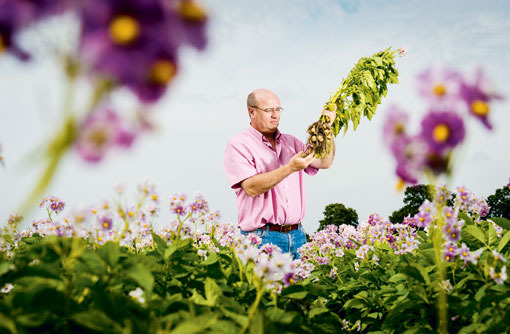Arable Farmer Award shortlist: Tony Bambridge

All three finalists started out from humble beginnings and have built up profitable arable enterprises. The key to their success has been a focus on costs and identifying a gap in the market, such as offering a premium seed potato service or establishing their own-brand new potatoes or mini-carrots. Richard Allison reports
The Scottish seed potato industry has an excellent global reputation for its high health status seed. But one corner of north Norfolk also has a good name for seed, thanks to Tony Bambridge.
It started in 1987 when he travelled as part of his Nuffield Scholarship looking at the European potato industry. He saw a gap in the market and established a seed business in north Norfolk.
Today he is producing 140ha of seed, renting blocks of virgin potato land, ideal for seed production, from local farmers. “This area is not known for potato growing and there are not many crops in the area,” he says.
Varieties include Desire, Asterix, Estima, Vales Sovereign, Maris Peer and Maris Piper and are grown under the Potato Council’s Safe Haven certification scheme. He only uses Scottish inputs.
Farm Facts
- Total area of 1,250ha, of which 1,070ha is arable
- Farming across six sites with mix of tenancy and contract farming agreements
- 19 staff
- Cropping: seed potatoes, ware potatoes, sugar beet, winter wheat, oilseed rape, spring barley for seed, malting barley, peas and horseradish
About 15% is exported with the rest sold direct to growers in the UK, as part of a premium service. “It’s all about customer service and we offer a just-in-time delivery aimed at the top end of the market,” he says.
This strong customer focus also applies in his relationship with the landowners, with full transparency in invoicing and costs. Detailed records including timesheet analysis means he knows the cost of each job to two decimal places.
“This gives our owners confidence in the cost of each operation,” he says.Detailed analysis enabled Mr Bambridge to identify weak areas of the business. For example, it highlighted costs were too high for the pre-pack potato side.
“The coarse sands [in the soil] meant it was difficult to meet strict skin-quality requirements with downgrades approaching 25% rather than an acceptable 15%.”
So he opted to concentrate solely on the processing market, supplying Birds Eye and McCain via Greenvale.
He firmly believes in investing in training and empowering staff. All key members have a particular responsibility, such as sprayer operator, potato store manager, potato field manager and sugar beet manager. “It helps motivate them and you get the most out of them, as they enjoy the job more.”
Extra staff help during the busy potato lifting season and in slacker periods between the earlies and main crop, the staff help with Tony’s niche horseradish business.
The judges liked:
- Excellent staff engagement
- Good use of website as tool
- Excellent looking crops despite challenging year
- Good customer focus for seed potatoes
He grows and supplies English horseradish and has built up expertise in processing the crop. “It is labour-intensive, but utilises potato staff at a quiet time of the year and offers another value-added crop,” he says.
While many growers have a website to promote their business, Tony has taken this further using it as an information-sharing tool.
“Our agronomist, British Sugar fieldsman plus Greenvale experts, have login access to a secure area. We share information such as seed potato stocks, disease status, analysis test results, and so on.”
Sugar beet is his other key crop, growing 190ha, and he is a member of the exclusive 100t/ha club.
Break crops include cereals, oilseed rape and peas. He looks to add value where possible growing premium crops and is one of the largest growers of Maris Otter malting barley for the real ale sector and Hereward milling wheat for Warburtons. Last year his Oakley wheat averaged 9.1t/ha and spring barley averaged 4.9t/ha.
Technology including RTK guidance is a key part of his drive to maximise yields, as well as managing soils to avoid compaction. He has been successfully using non-inversion tillage for potatoes and sugar beet for about seven years.
“We use a Sumo Trio once on light land for potatoes with two passes on heavier ground, the first pass at 15cm deep and then we go deeper for the second pass at 25-43cm to ensure there is no pan. Cultivations are done in the same line as the ridging using RTK.”
Finally, he is passionate about getting young people into farming providing placements for college students. The company also takes part in the Spring Fling at the Norfolk Showground showing kids how to grow potatoes and generate interest in farming.
A word from our sponsors
 British Sugar produces over 1m tonnes of sugar from the 8m tonnes of sugar beet grown in the UK by 4,000 farmers. The industry is dedicated to maximising the production of the crop as well as the four sugar factories to enable a sustainable future.”
British Sugar produces over 1m tonnes of sugar from the 8m tonnes of sugar beet grown in the UK by 4,000 farmers. The industry is dedicated to maximising the production of the crop as well as the four sugar factories to enable a sustainable future.”
Paul Bee, British Sugar
Read more
Find out more about the 2012 Farmers Weekly Awards including details on how to book tables for the event’s glittering London awards bash

